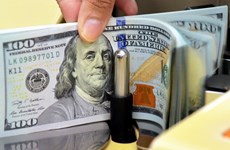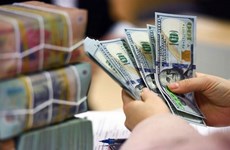USD loans surge 10 percent in first half of 2014
Credit growth in foreign currencies increased by 10 percent in the first
half of this year stirring both confidence and doubts about the foreign
liquidity of the banking system.
Credit growth in foreign currencies increased by 10 percent in the first
half of this year stirring both confidence and doubts about the foreign
liquidity of the banking system.
The 10 percent growth of dollar loans is likely to be significant, especially when the overall credit growth in the first six months was an estimated 2.3 percent.
Le Xuan Nghia, member of the National Financial Supervisory Council, quoted by baodautu.vn website, saw this surge as a good sign.
"The statistics indicate that the status of foreign liquidity at banks is worry-free," Nghia said.
"Banks may see they don't necessarily stock foreign currencies that might lose its appeal. They can purchase it if required," he added.
The State Bank of Vietnam reports showed that borrowing costs of dollar loans were 3 to 4 percentage points lower than of dong loans, which is blamed for the recent steady increase.
Annual interest rates charged over privileged loans hover around 7 to 8 percent. For manufacturing sectors, the rates are 9 to 10 percent for short terms and 10.5 to 12 percent for mid and long terms per year. For dollar loans, popular lending rates are 3 to 7 percent annually.
Director of a Ho Chi Minh City-based export company deposited Vietnamese dong to get 6 to 7 percent saving interest then used the deposit paper as collateral to borrow dollar loans at 4 to 5 percent interest rates at banks.
Regarding the big gap between the rates of dong and dollar, industry experts said that the increasing favour of dollar loans was understandable.
Huynh Buu Son, an independent expert, cited by thanhnien.com.vn, saw risks in banks' liquidity of foreign currencies as the ratio of lending over deposit reached 99.5 percent.
He said that banks needed to have a provision fund to secure their foreign liquidity if depositors withdrew money.
It should be noted that the State Bank is not equipped to offer support to banks which run into problems with foreign currency liquidity.
In May, the State Bank admitted to high risks when businesses continued to prefer foreign currency loans.
Economists have urged the central bank to cut the dong interest rate further, in order to ease the capital cost burden on businesses. The central bank said it would take time to consider the issue thoroughly for the sake of the dong position in the long run.
Pham Xuan Hoe, deputy head of the central bank's Monetary Policy Department said that as of June 25, the total supply of the system increased by 6 percent. Roughly 87 to 90 percent of capital sources at banks flew into Government bonds and State Treasury bills.
Hoe said that a large amount of money should be directed into the market to support economic recovery instead.-VNA
The 10 percent growth of dollar loans is likely to be significant, especially when the overall credit growth in the first six months was an estimated 2.3 percent.
Le Xuan Nghia, member of the National Financial Supervisory Council, quoted by baodautu.vn website, saw this surge as a good sign.
"The statistics indicate that the status of foreign liquidity at banks is worry-free," Nghia said.
"Banks may see they don't necessarily stock foreign currencies that might lose its appeal. They can purchase it if required," he added.
The State Bank of Vietnam reports showed that borrowing costs of dollar loans were 3 to 4 percentage points lower than of dong loans, which is blamed for the recent steady increase.
Annual interest rates charged over privileged loans hover around 7 to 8 percent. For manufacturing sectors, the rates are 9 to 10 percent for short terms and 10.5 to 12 percent for mid and long terms per year. For dollar loans, popular lending rates are 3 to 7 percent annually.
Director of a Ho Chi Minh City-based export company deposited Vietnamese dong to get 6 to 7 percent saving interest then used the deposit paper as collateral to borrow dollar loans at 4 to 5 percent interest rates at banks.
Regarding the big gap between the rates of dong and dollar, industry experts said that the increasing favour of dollar loans was understandable.
Huynh Buu Son, an independent expert, cited by thanhnien.com.vn, saw risks in banks' liquidity of foreign currencies as the ratio of lending over deposit reached 99.5 percent.
He said that banks needed to have a provision fund to secure their foreign liquidity if depositors withdrew money.
It should be noted that the State Bank is not equipped to offer support to banks which run into problems with foreign currency liquidity.
In May, the State Bank admitted to high risks when businesses continued to prefer foreign currency loans.
Economists have urged the central bank to cut the dong interest rate further, in order to ease the capital cost burden on businesses. The central bank said it would take time to consider the issue thoroughly for the sake of the dong position in the long run.
Pham Xuan Hoe, deputy head of the central bank's Monetary Policy Department said that as of June 25, the total supply of the system increased by 6 percent. Roughly 87 to 90 percent of capital sources at banks flew into Government bonds and State Treasury bills.
Hoe said that a large amount of money should be directed into the market to support economic recovery instead.-VNA













